Pensacola was once the anti-abortion battleground as bombings and murders rocked nation
Only hours after a leaked draft opinion from the U.S. Supreme Court signaled the high court's decision to likely overturn Roe v. Wade, a group of abortion rights supporters rallied in downtown Pensacola last month to voice their opposition against the 1973 landmark ruling on a woman's right to seek an abortion. They held signs that read "We won't go back, we will fight back!"
The scene that unfolded that day on Palafox Street in front of the federal courthouse — and that will likely gain momentum following the historic ruling Friday — was a stark contrast, a 180-degree turn of events, for a city that had for decades been the fervent core of the country's anti-abortion movement.
A small but vocal group of anti-abortion demonstrators have picketed near Pensacola's only abortion clinic, week after week, dating back to the 1980s. Rarely — if ever — have they missed a Saturday to express their impassioned objection to what they view as the killing of an innocent child. They often hold poster-sized signs of brutal images of bloody, aborted fetuses. They hang those same images from trucks that crawl along Davis Highway.
Denied parole: Michael Griffin, murderer of Pensacola abortion doctor David Gunn, is denied parole
Pensacola's role: Pensacola plays pivotal role in abortion struggle
Key events: Key events in Pensacola's abortion battle
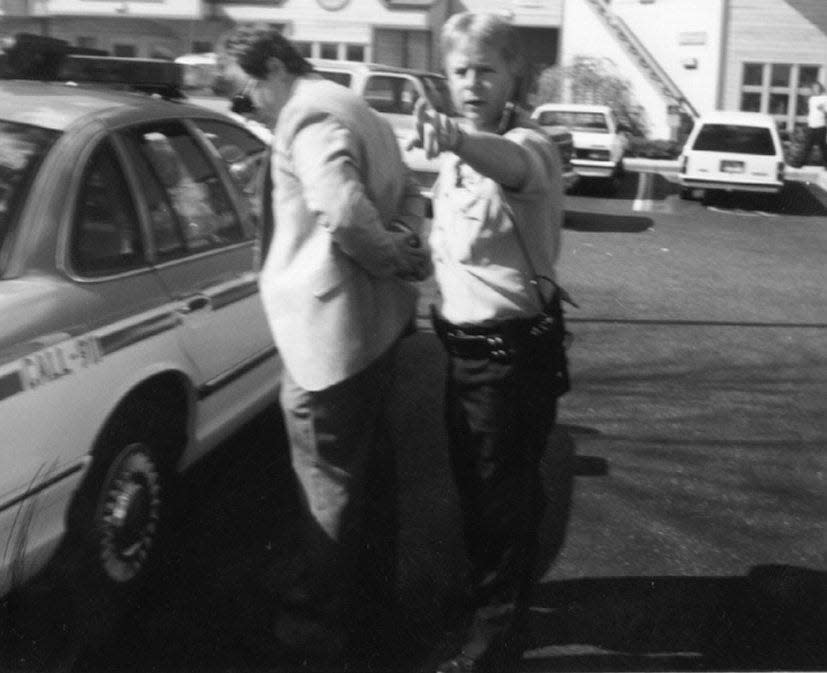
Over the years, the anti-abortion protests have become almost routine, but there was a time during the 1980s and 1990s when the city witnessed first-hand an outbreak of violence that attracted the eyes of the nation.
The years 1984 and 1994 mark two bookends of a 10-year-period when the abortion debate erupted into violence on the streets of Pensacola with bombings of clinics and assassinations of three people.
This is the story of how a radical group of protestors turned to violence to instill fear against clinic staff — people they viewed as enemies to their cause.
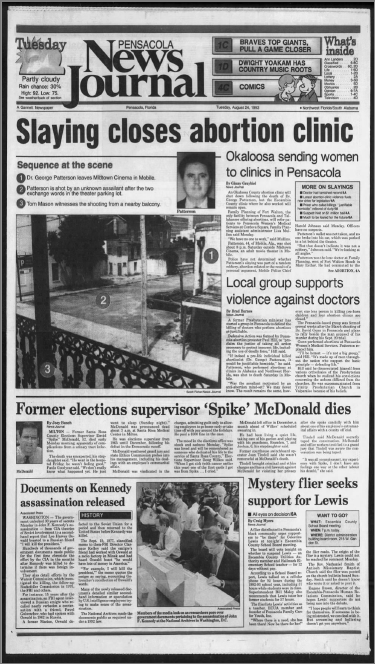
'A present for Jesus'
A year after the U.S. Supreme Court issued its opinion in Roe v. Wade in 1973, The Ladies Center was one of four abortion providers that opened in Pensacola. For 10 years, the center operated without incident.
"When we began 21 years ago, the major objection to the clinic was an economic one," Linda Taggart, administrator of The Ladies Center in Pensacola, told CSPAN in a 1995 interview. "The hospitals were doing abortions in those days after the laws had changed in '73. The doctors were doing abortions and they were getting a lot more money for them than we were offering services for. So that was the major objection was economics."
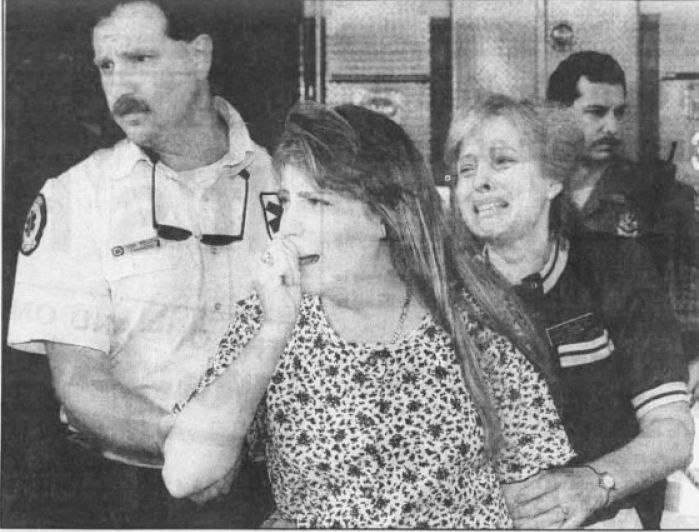
In 1983, Taggart said the nationwide anti-abortion protest movement began in Pensacola, driven by extremists who believe violence was justified to stop abortions.
"That's when the whole atmosphere changed," Taggart said. "Then we were no longer being attacked for economic reasons, we were being attacked for what we did."
Linda Taggart's daughter, Keri Taggart, witnessed all of it first-hand and would go on to work for her mother at The Ladies Center.
Recalling those events in an interview this week, Keri Taggart told the News Journal that anti-abortion advocates would target her even before she worked at the clinic just for being her mother's daughter.
National emergency: Exclusive: Black congresswomen urge Biden to declare public health and national emergency around abortion
Facing jail: Online data, medical records could be used to put women in jail under new abortion laws
She said that one night while attending church, undercover Pensacola police officers approached her and her mother, informing them there was a plot to kidnap Keri.
"I ended up having to go to DeFuniak Springs for a long weekend," Keri Taggart said. "Just until they felt that it was safe enough for me to come back."
Another incident happened in 1985 when she turned 18 and an anti-abortion advocate filed a police report against her alleging she assaulted a protester on a bike.
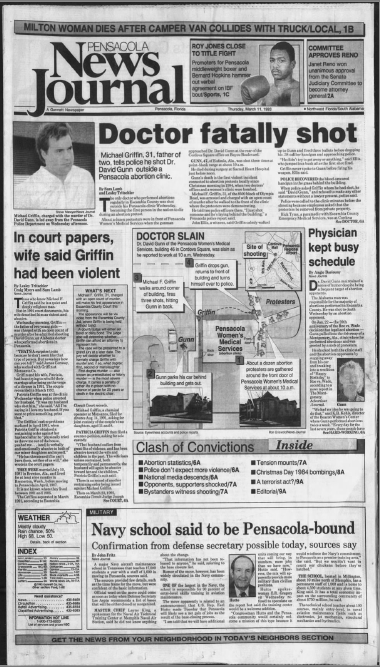
Keri Taggart described her teenage years as being "a goody-two-shoes," and it was a shock to have to turn herself into police and go through the legal battle of getting the claim tossed from court.
Throughout the early 1980s, protests against the clinics drew large crowds, and during a few incidents, protesters were arrested for trespassing. On Mother's Day 1983, a large anti-abortion rally drew up to 3,000 people to Seville Square. Then Pensacola Mayor Vince Whibbs declared the day "Right to Life Day" in the city.
Then in June 1984, a bomb damaged The Ladies Center at its location near the University Mall. The bomb went off at 4 a.m. when no one was in the building and caused a reported $40,000 in damage. No one was ever charged for the bombing. The Ladies Center relocated to a building on Ninth Avenue and reopened a month later.
Seven months later on Christmas morning 1984, three bombs went off in Pensacola within 20 minutes of each other at The Ladies Center and two doctor's offices that provided abortions.
The coordinated bombings drew national attention to Pensacola. Two men, Matt Golsby and Jimmy Simmons, and two women, Kaye Wiggins and Kathy Simmons, were charged in the bombing, which Wiggins later told the press was "a present for Jesus on his birthday."
At trial, the four defendants' attorneys argued everything from their clients' religious beliefs to their actions being influenced by Ronald Reagan and the 1984 film "Dune," according to news reports at the time.
Golsby and Jimmy Simmons were convicted of the bombing and sentenced to 10 years in federal prison, ultimately only serving about half of that time, while the two women were convicted on conspiracy charges and put on probation.
Opinion: Counting fireflies, waiting to see if Roe v. Wade ruling will darken my granddaughters' future
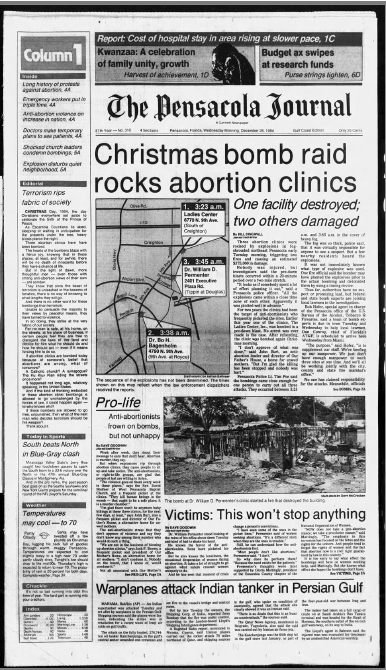
The bombings didn't slow down the protests against abortion clinics led by Milton resident John Burt. More incidents of vandalism and trespassing occurred at the clinics over the next few years.
Burt, a Marine and ex-Klansman turned abortion opponent, described himself at the time as a "spiritual adviser" to the bombers, though he would later deny having any influence over them.
Burt also opened Our Father's House to provide an alternative for abortion as a women's shelter that provided a space for women to go through with their pregnancy as long as they followed strict religious rules.
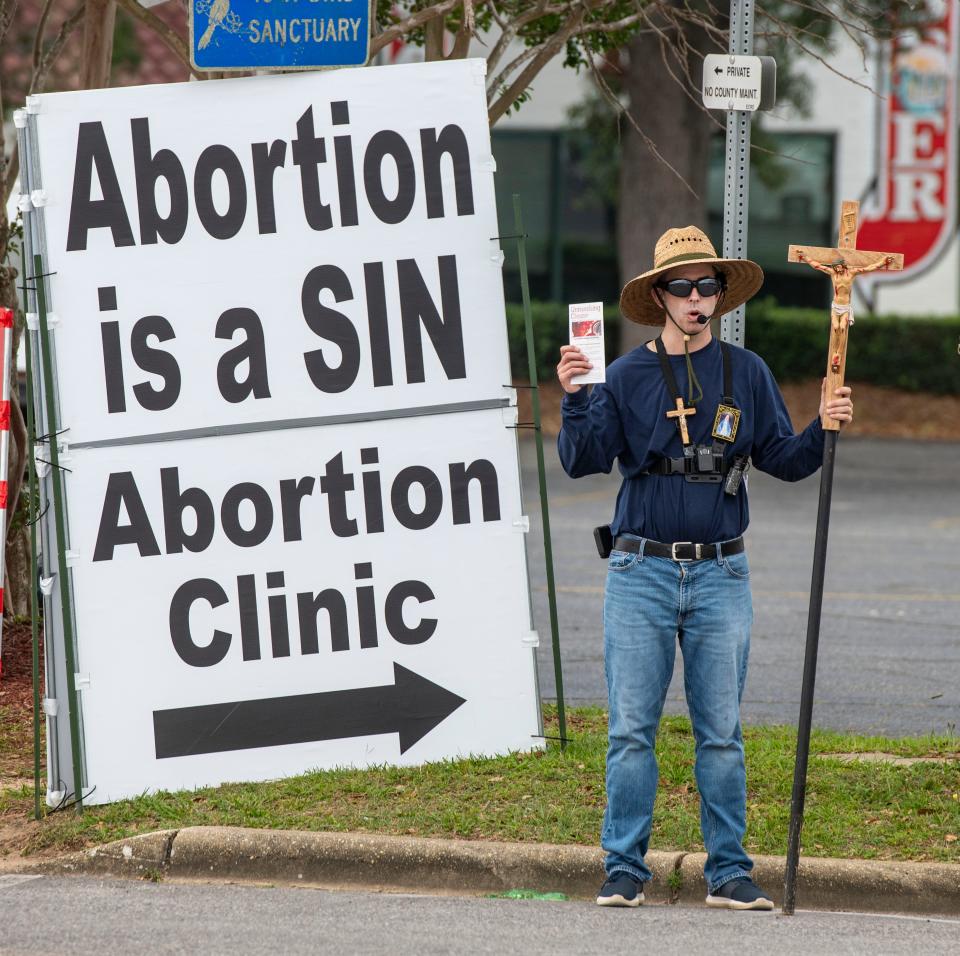
Protests continued throughout the 1980s and there was one incident of eight protesters being arrested for picketing outside of an Escambia County judge's home after the judge sentenced a man to five years in prison for burglarizing The Ladies Center.
In 1988, another Pensacola bombing was thwarted when Kentucky native John Brockhoeft was arrested by police with bomb parts in his car. Brockhoeft was later convicted of a 1985 firebombing of an abortion clinic in Cincinnati, Ohio, and served several years in federal prison.
Burt was placed under house arrest for two years for driving Brockhoeft as he scouted out The Ladies Center. When Burt was released, he bought the property surrounding The Ladies Center and set up a near-constant picket of the abortion clinic. He even built stands so protesters could see and shout over the privacy fence that surrounded the clinic.
Despite the protesters and attacks, Keri Taggart said there were always people in the community willing to help the clinic and the patients.
"We were so blessed to have escorts that volunteered their time every single day that we have procedures done," Keri Taggart said.
She said volunteers helped provide a calm atmosphere inside the doors of the clinic, despite protests outside.
"Once we got the patient into the clinic, it was a different atmosphere for them," Keri Taggart said. "We understood what they were going through. ... We treated them individually. We hugged them. We cried with them. We just tried to make it the best that we could for them considering the circumstances that they were in."
Assassinations of doctors
The violence in Pensacola escalated March 10, 1993, during another anti-abortion protest organized by Burt at the Pensacola Women's Medical Services in Cordova Square.
In the parking lot behind the clinic, Michael Griffin walked up to Dr. David Gunn as he was getting in his car and said, "Don't kill any more babies" — before shooting Gunn three times.
Griffin then walked around the building to where a Pensacola police officer was standing and said, "I just shot a man back there."
Griffin was convicted of Gunn's murder and is still serving a life sentence.
Although that shooting wasn't at The Ladies Clinic, Gunn also had worked there and was close with Linda Taggart.
14th Amendment role: What is the 14th Amendment and what does it have to do with Roe v. Wade?
Call for code of ethics: Supreme Court justices don't have a code of ethics. Hundreds of judges say that's a problem
Keri Taggart said Gunn's murder was a devastating blow for her mother.
"My mom and Dr. Gunn were best friends, and it was devastating for her," she said.
It was five days after the killing of Gunn that Pensacola resident Paul Hill called into "The Phil Donahue Show" declaring himself the new national spokesman for "abortionist killers."
Hill soon made several more media appearances openly advocating for violence to stop abortion.
The Florida Department of Law Enforcement began monitoring Hill's activities. Hill's church, Trinity Presbyterian in Valparaiso, ex-communicated him over his views.
On the morning of July 29, 1994, Hill was set up outside The Ladies Clinic for his weekly protest, but this time he also brought a 12-gauge.
Keri Taggart, who was six months pregnant at the time, said she arrived at work at 6 a.m. that day and saw Hill. She recalled Hill made a comment to her as she walked in the door.
"He's like, 'Oh Keri' you know, whatever he says to us, because, again, he knew our names," she said. "We just went into the clinic and started working to prepare (for the day)."
Shortly after 7 a.m., a truck carrying Dr. John Britton, James Barret, Britton's volunteer bodyguard, and June Barret pulled into the parking lot to drop Britton off for work at the clinic.
What could happen: Supreme Court ruling poised to trigger maze of state abortion laws
Opinion: Your right to conceive babies could be at risk if Roe v. Wade is overturned
Keri Taggart said she saw through a window the truck pull into the parking lot, and then she heard the shots.
Hill walked up to the truck and began shooting into the truck, killing Britton and James Barret and wounding June Barret.
Pensacola was now the site of the first two assassinations of abortion doctors in the U.S.
Keri Taggart heard the shots and immediately ran to lock the front door before running into her mother's office and calling 911.
She said her fear was that her mother was going to arrive any minute and pull into the parking lot with Hill wielding a shotgun. Police arrived before her mother did.
"She just happened to be late that day," Keri Taggart said.
Keri Taggart said she'll never forget seeing the image of the bodies of Britton and James Barrett in the parking lot.
"Blood was running down the driveway, and it's just a vision that's just photographed in my mind. It's just lasered in my brain, and I'll never ever be able to get rid of that," she said.
Hill was convicted of the murders and executed by the state of Florida in 2003. Hill said he never felt remorse for the murders and continue advocating his position from prison until his execution.
Burt held a press conference to denounce Hill and acts of violence against abortion doctors. While holding a three-month-old baby in front of reporters Burt shouted, "This is what we're about. We're about life, not death."
A few days later, Burt's viewing stands surrounding The Ladies Clinic were demolished under code enforcement orders by the city of Pensacola as unsafe structures.
U.S. Marshals were sent to protect the clinic in the wake of the murders. Despite the violence, Keri Taggart returned to work after the birth of her daughter.
"I was very skittish, very, very skittish," she said.
Eventually, she said she felt safe again, thanks to protection from the U.S. Marshals and eventually felt safe enough to bring her daughter to work on days when the clinic didn't perform procedures.
Linda Taggart retired in the 2000s, and The Ladies Clinic soon merged with the remaining abortion clinics in Pensacola and became the Community Health Care Center.
Burt soon lost his property surrounding the clinic as part of a settlement in a civil lawsuit with the family of Gunn and the Southern Poverty Law Center.
In 2003, Burt was charged with sexually molesting a child when a 15-year-old girl who had taken shelter at Our Father's House accused him of groping her and propositioning her for sex. The shelter was closed down and Burt was convicted in 2004 and sentenced to 18 years in prison. He died in prison in 2013.
The last publicly reported act of vandalism against the clinic occurred in 2012 when it was torched by an Alabama man named Bobby Joe Rogers.
Rogers later told investigators he decided to burn down the clinic while attending an anti-abortion protest in front of the clinic and saw a young woman enter the building. Rogers returned to the clinic that night and threw a beer bottle filled with gasoline at the building, setting it on fire.
The building was severely damaged and ultimately torn down because of the fire. The now renamed American Family Clinic moved to its current location off Davis Highway on Village Oaks Drive.
Extremism vs. nuance
Today, there is a growing fear that the debate over abortion rights will only grow more intense now that federal protection has been lost.
The watershed decision that overturned Roe v. Wade erased reproductive rights in place for nearly five decades. In the court's most closely watched and controversial case in years, a majority of the justices — all of whom were appointed by Republican presidents — held that the right to end a pregnancy was not found in the text of the Constitution nor the nation's history.
Melissa Fowler, chief program officer at the National Abortion Federation, told the News Journal in a written statement that the organization was preparing long before the decision came out.
"In just the first few months of 2022 alone, there were two clinic invasions, three attempted invasions, one blockade, and five other incidents where demonstrators trespassed on clinic property and refused to leave," Fowler said.
Keri Taggart said she believes while protests at abortion clinics will be a constant, it won't deter the women who work there.
"Women who work in a clinic that provides abortions, they're very strong-willed women," she said. "It's not an easy job. It's very emotional, and you've (got to be) very strong-willed and believe in the pro-choice movement."
Keri Taggart said it is the patients who aren't used to the protests. When she worked at the clinic, she said staff and volunteers did their best to try to shield the patients from the protesters, including holding shields to block the protesters' view of the patients.
Last spring, protests in Pensacola escalated outside the American Family Planning clinic as the anti-abortion protests drew counter-protests from people supporting abortion rights.
After several months of weekend protests, all of the businesses along Village Oaks Drive signed trespass warnings against the protesters, forcing the relocation to the current site on Davis Highway, according to reports from the public radio station WUWF.
There are also growing concerns of extremist abortion rights supporters using violence to terrorize "pro-life pregnancy centers" and churches seeking to help pregnant women give birth. Over the Memorial Day weekend, a group of vandals scribbled "If abortions aren’t safe then niether [sic] are you," and "Janes revenge" in Hollywood, Florida, on the outside walls of the South Broward Pregnancy Help Center, which is run by the Catholic Archdiocese of Miami.
U.S. Sen. Marco Rubio, R-Fla., sent a letter to U.S. Attorney General Merrick Garland urging his office to investigate the "left-wing group Jane's Revenge" and their call for "open season" against pro-life pregnancy centers and organizations.
"To date, there has not been a single charge brought against any individual or group despite the countless pro-life centers in America that have been firebombed and vandalized in recent months," Rubio wrote.
Up until May, Pensacola was one of the few locations on the Gulf Coast where a woman could get an abortion.
However, in May, American Family Planning was ordered to close by the Florida Agency for Health Care Administration after it found a doctor at the clinic violated the clinic's own policy and failed to report the hospitalization of three patients who nearly died during second-trimester abortions.
That hasn't deterred anti-abortion protesters, who have appealed to neighboring Santa Rosa County to pass a county-wide ban on abortion, despite the county likely not having the power to regulate abortions. The same protestors have attended the Escambia County Commission's public forum to lobby that county to do the same.
Voters of the area have routinely elected politicians who campaign on their "pro-life" principles, but polls show that nationwide, voters often have to make a binary choice of Republican or Democrat, "pro-life" or "pro-choice" that don't reflect their own views on abortion.
During her time at The Ladies Center, Keri Taggart recalled one occasion when family acquaintances who were against abortions came into the clinic when their teenage daughter had an unwanted pregnancy.
"What I found sad was they were pro-life until they walked in the door, and she got her abortion done," Keri Taggart said. "Then when they walked back out the door, they were pro-life again. Women get abortions whether they are pro-life or pro-choice."
Other Supreme Court ruling: Supreme Court's Second Amendment decision demands courts look to history, tradition
Senate passes gun bill: Senate passes bipartisan gun deal for the first time in three decades, giving Biden needed win
The Pew Research Center released a detailed survey of Americans' views on abortion earlier this month and found there was a lot of middle ground on the issue.
Only 19% of Americans believe abortion should be legal in all cases, and fewer than 8% believed it should be illegal with no exceptions. The other 71% of Americans fell in between those extreme positions, according to the survey.
The Pew Research Center polled 10,441 U.S. adults who were designed to be a representative sample of the U.S. population.
Of the 71%, the survey said 36% of Americans believe abortion should be "legal in most cases" and another 6% thought it should be "legal in all cases, but there are some exceptions when abortion should be against the law."
On the other side, leaning more anti-abortion but with room for exceptions, 27% said abortion should be "illegal in most cases" and 2% said abortion should be "illegal in all cases but there are some exceptions when abortion should be legal."
Pensacola resident Patricia Edmisten view's on abortion is an example of the complexity and nuance people can bring to the issue.
Edmisten, a retired professor at the University of West Florida where she taught philosophy and sociology of education, is a staunch supporter of the Democratic Party but said she approaches abortion from philosophical first principles and the study of science.
"Take a bud or a seed of a plant and that starts to sprout," Edmisten said. "That's life, then the same is true for a fetus."
At the same time, Edmisten said it's not right to force women to go through with pregnancies, especially when it is a result of rape or some other type of sexual abuse.
"We do know that abortions will take place, and they will be brutal in some cases. Or those who have safe (abortions) will have the money to pay for them," Edmisten said. "All I know is that pro-life also means not forcing that child, not forcing that rape victim, not forcing that abused wife, or a single person or someone who's attacked in the street to have a baby."
Jim Little can be reached at jwlittle@pnj.com and 850-208-9827.
This article originally appeared on Pensacola News Journal: Abortion: Pensacola has a long complex role in the Roe v Wade debate

